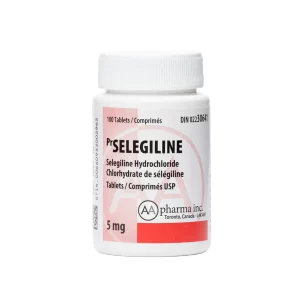Your cart is empty.

Your cart is empty.
Nootropics, often called “brain-boosting supplements” or “smart drugs,” have gained popularity in recent years. They appeal to students seeking academic advantages, professionals seeking to boost productivity, and those interested in maintaining cognitive health and longevity.

Buy Selegiline to support cognitive function, emotional balance, and longevity. Maintain mental clarity and overall well-being with this trusted medication.
If you’re looking to buy nootropic supplements, you’ll find many options available, including the ability to buy nootropics online. This article explores what nootropics are, their effects on brain chemistry, potential benefits, leading options, and safety considerations.
Nootropics are substances designed to enhance cognitive functions. They include both natural compounds, such as certain herbs and amino acids, and synthetic substances developed in laboratories. Their main purpose is to improve memory, focus, attention, motivation, and mood.
There are two main types of nootropics: over-the-counter supplements, which are generally safe and widely available, and prescription nootropics, which are pharmaceuticals prescribed for conditions like ADHD or Alzheimer’s disease. The latter requires medical supervision due to its stronger effects and potential side effects.
Nootropics enhance brain function by modulating neurotransmitters, increasing blood flow, providing neuroprotection, and promoting neuroplasticity. They adjust neurotransmitter levels, affecting how information is processed. Some nootropics enhance cerebral blood flow to ensure the brain receives sufficient oxygen and nutrients for optimal performance. Others protect against oxidative damage, while promoting neuroplasticity can improve learning and adaptability.
Nootropics affect brain chemicals such as dopamine, serotonin, and acetylcholine. Dopamine is associated with reward and focus, while serotonin affects mood and sleep. Acetylcholine is crucial for learning and memory, with compounds such as Alpha-GPC and Citicoline enhancing its production. Racetams, such as Piracetam and Aniracetam, also impact neurotransmitter systems related to cognition. Their effectiveness varies from individual to individual due to genetic factors, health conditions, and dosage.
While numerous compounds are marketed as nootropics, some stand out due to their research backing or unique mechanisms. When you buy nootropics or order nootropics online, you’ll encounter a wide array.
Selegiline
Selegiline is a prescription nootropic that works by inhibiting the MAO-B enzyme, which increases dopamine levels to enhance motivation, focus, and mood. While primarily used for Parkinson’s and depression, it’s also explored in longevity and cognitive enhancement circles for its potential neuroprotective effects.
Rapamycin
Rapamycin, though not a traditional nootropic, is gaining attention in the biohacking community for its ability to promote cellular repair and longevity, potentially supporting long-term brain health. Its mTOR-inhibiting effects may help reduce neuroinflammation and improve resilience against cognitive aging.
Dasatinib
Dasatinib is a cancer medication that, when combined with compounds like quercetin, is being studied for senolytic effects that may rejuvenate aging brain cells. While not a classic nootropic, it holds emerging potential in enhancing cognitive longevity through targeted cellular renewal.
Other popular nootropics include:
Nootropics are believed to offer cognitive benefits, but their effectiveness varies depending on the compound, dosage, and individual factors. While there are many personal anecdotes, scientific evidence is inconsistent. It’s best to consult a healthcare professional before starting any nootropic, especially if you have health conditions.
Many nootropics are investigated for their potential to enhance memory and learning, including improvements in short-term recall and working memory. Compounds like racetams (e.g., Piracetam, Aniracetam) may improve synaptic plasticity, thereby facilitating learning and memory consolidation. Cholinergic compounds, affecting acetylcholine, are also significant since this neurotransmitter is crucial for memory formation.
For both students and professionals, maintaining attention and focus is crucial. Nootropics like L-theanine, found in green tea, can enhance focus when combined with caffeine without jitters. Prescription options such as modafinil also improve wakefulness and attention. It’s essential to differentiate between stimulant options that boost alertness and non-stimulant alternatives that may regulate neurotransmitter balance.
Certain nootropics and adaptogens, like ashwagandha and Rhodiola rosea, help reduce stress by regulating cortisol levels. They can also enhance serotonin and dopamine, improving mood and reducing anxiety. A balanced mental state promotes clearer thinking and better decision-making, indirectly boosting cognitive performance.
Some individuals use nootropics, like Noopept and low doses of certain psychedelics, to potentially enhance creativity and flexible thinking. While anecdotal reports exist of benefits in divergent thinking and novel problem-solving, robust scientific evidence supporting these effects in healthy individuals is still being developed.
The safety of nootropics varies depending on the compound, dosage, and individual health. It’s essential to research ingredients, select reputable manufacturers, and consult a healthcare professional.
Nicotine may enhance attention and memory by interacting with nicotinic acetylcholine receptors, but its addictive nature and health risks make it a poor choice for cognitive enhancement. While safer alternatives like nicotine gum or patches are being studied, caution is advised.
The term “nootropic” refers to substances that enhance cognitive function. While some prescription medications are used for mental disorders, many over-the-counter supplements lack strong scientific support. Consumers should conduct thorough research to make informed decisions.
Prescription nootropics like Adderall and Aricept are FDA-approved for specific conditions. Most over-the-counter nootropics are dietary supplements that don’t require FDA approval; the FDA intervenes only if they are unsafe or make false claims.
Nootropics are gaining popularity due to academic and workplace pressures, sparking interest in cognitive enhancement. Initial studies on “smart drugs” for ADHD and Alzheimer’s drew attention from healthy individuals, while online communities promote “biohacking.” The rise of brain health supplements has further increased their usage.



